By Angelique Ruhi-Lopez - Florida Catholic
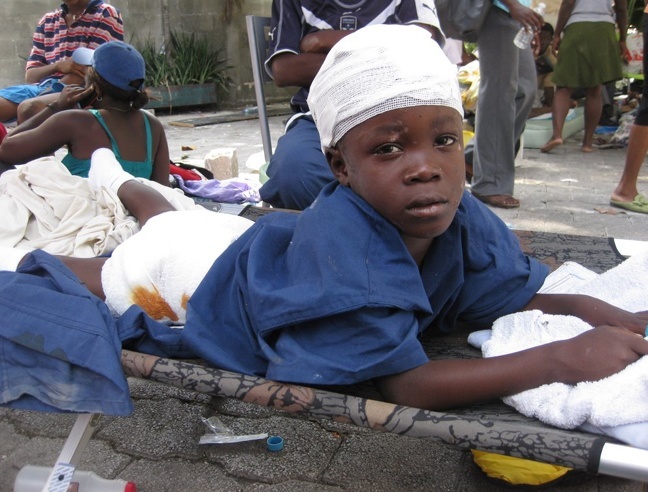
Photographer: COURTESY PHOTO | Brittany Galvin
A child injured by the Jan. 12 earthquake lies on a stretcher after receiving medical attention in one of the makeshift hospitals that now dot Port-au-Prince.
MIAMI � He called it �a journey of hope�, despite the devastation.
Msgr. Jean Pierre, pastor of St. James Parish in North Miami, returned Feb. 8 from Haiti after spending three weeks leading an aid mission in his home country. He left for Haiti Jan. 13, the day after the devastating earthquake that has killed, at last count, 230,000 people.
�I witnessed the determination of the people and was also to be with them in their suffering and pain,� Msgr. Pierre said. �It was a humbling experience.�
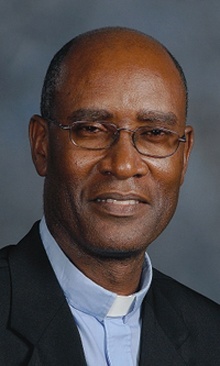
Photographer: FILE PHOTO
Msgr. Jean Pierre just returned from spending three weeks in Haiti.
What he saw when he arrived was unlike what is being televised, he said.
�What you see on TV is only half of what happened to the people, to their emotions. There is total destruction, not only physical but emotional. People are still in a daze,� said Msgr. Pierre, who also lost friends and family members in the earthquake; a 25-year-old cousin is still unaccounted for.
Msgr. Pierre was in Haiti to help address some of the immediate concerns of the Church in Haiti and assess how the Archdiocese of Miami could help longer-term. He brought with him food, tents and approximately $8,000 provided by the archdiocese for the Haitian church and several religious orders, many of whom were badly hit and lost their convents and schools. He also brought with him hosts, wine, vestments, and other Church-related supplies so that Mass could continue to be celebrated.
�Masses are still being held, and they�re taking place outside � everybody lives outside,� said Msgr. Pierre. �A number of the churches have been turned completely into rubble. Those that are still standing have cracks and aren�t safe.�
BEAUTY AMIDST CRISIS
In addition to providing pastoral care, Msgr. Pierre accompanied a few medical teams who visited camps and cared for the injured, among them more than 150 clergy, religious and seminarians.
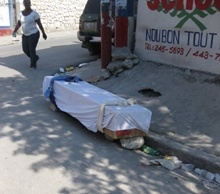
Photographer: COURTESY PHOTO | Brittany Galvin
A coffin lies by the side of one of Port-au-Prince's streets after the Jan. 12 earthquake that, at the last estimate, is said to have killed 230,000 people.
In addition to trouble getting supplies to the right places, gangs around Port-au-Prince have been a cause for concern. He also said there is a continual need for medical care and urges volunteer doctors, nurses, counselors and people in the medical field to continue their medical missions to Haiti to assist those who are suffering.
�It�s a humanitarian crisis,� said Msgr. Pierre, who was the first Haitian priest ordained in the Archdiocese of Miami and also serves as director of the Society for the Propagation of the Faith, the archdiocesan Missions Office and the Ministry to Cultural Groups.
�Many people are coming down with pneumonia, fever, and diarrhea and need assistance continually. There are many infections and gangrene, since a lot of people are losing legs and arms and are not being properly cared for,� he continued.
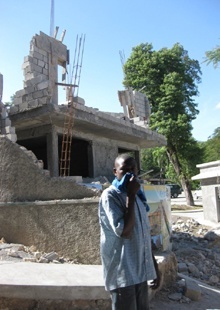
Photographer: COURTESY PHOTO | Brittany Galvin
A man covers his face to ward off the smell as he walks by a crumbling building in Port-au-Prince a few days after the 7.0 earthquake.
Despite this, he said he saw �a lot of beautiful things.�
�People didn�t have anything but I saw them coming together,� said Msgr. Pierre, who saw his own faith strengthened by the people�s spirit and admitted he found it hard to leave � he wanted to continue accompanying the people in Haiti.
�In one camp with about 8,000 people, the people were getting by sharing whatever water and food they had to survive. It was really a beautiful thing to see,� Msgr. Pierre said.
RECUPERATING, REBUILDING
He said he hopes the U.S. and other countries can be more open about accepting Haitians for a time so they may recuperate, receive needed medical attention and get ready to return and rebuild Haiti.
His own parish, St. James, has accepted 27 refugee children into the parish school. He said he has spoken at length with the children and their families.
�They are so eager to tell their stories,� he said. �When I ask them how many of them would be willing to go back (to Haiti), they said they would want to go back right now. People want to go on with their lives even if it has been difficult. People have come out of it strengthened and better than before. There is hope.�
He said he has also spoken to the children at the school who question how God would let this happen to them.
�I explained that an earthquake is part of the earth, like the sun on the horizon, and it is not the will of God,� he said. �God will be there with us. Those who die will have eternal life, and those who live will continue to be strengthened.�
Upon his return, Msgr. Pierre met with Archbishop Favalora to discuss the situation in Haiti and come up with short-term and long-term goals for assisting there.
�What the Archdiocese of Miami is trying to do is have a base in Haiti where we can launch whatever services that we can offer,� he said. �A short term goal now is to continue to offer healthcare and try to get food to some of the camps. At the same time, we also want to offer our services to the local clergy, especially those who were traumatized.�
He said his prognosis for the future of Haiti is mixed.
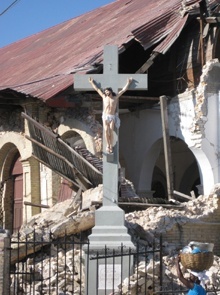
Photographer: COURTESY PHOTO | Brittany Galvin
A crucifix is the only thing left unscathed in the ruins of Sacre Coeur Parish in Haiti.
�I think that it�s a desperate situation and we are going to be there for the long haul,� he added. �It has to be a steady commitment to help. I hope it will be a good start.�
Parishioners at St. James have pledged the proceeds of their parish carnival, which took place the weekend of Feb. 13-14, to support relief efforts and build a school in Haiti.
�Some of the children have been traumatized; any little noise sets them on edge,� he said. �The best thing would be for them to go back to school but that�s not possible because most of the schools have been destroyed and teachers have been killed.�
The Haitian government has said school could start in March but Msgr. Pierre said he doubts that will be possible because the destruction has been too widespread.
�If the kids don�t get back to a normal routine, a lot of them would be completely lost, not just mentally but possibly physically too,� he said. �Our parish wants to support the children and create a modest school, under a large tent for now, where the children can go. We are asking other parishes to join us also. If we could at least help the schools, it would be a really great help to rebuild the country and bring hope to the future of Haiti.�

